Early lease termination letter written by tenants to notify the landlord of their intention to terminate a lease agreement earlier than previously agreed upon and request a formal release from the agreement. Once the request is accepted and the tenant has fulfilled all their pending contractual responsibilities, they are relieved of any financial and legal obligations under the lease agreement.
Early termination will typically result from unprecedented events such as financial struggles, relocation, or deployment by the military. Any legally justifiable reason can be enough justification for the early cancellation of a lease agreement. This letter lets the tenant convey this information to the landlord. Usually, early termination will attract a penalty for the tenant. Examples of penalties include forfeiting the security deposit, paying a few month’s rent, or an agreed-on fee. Alternatively, tenants can be asked not to pay any penalty as long as they can find a replacement or sublet the space.
One way of planning for it is to request a termination clause be added to the lease agreement before signing. However, it does not limit early termination to lease agreements with a termination clause; tenants can terminate their lease contracts under most conditions as long as they follow due diligence. Early termination of lease agreements is also subject to state laws, which tend to vary from state to state. However, writing this letter is a standard legal requirement to prevent disputes and misunderstandings and ensure tenants are legally protected from any future claims of lack of due diligence.
Free Templates
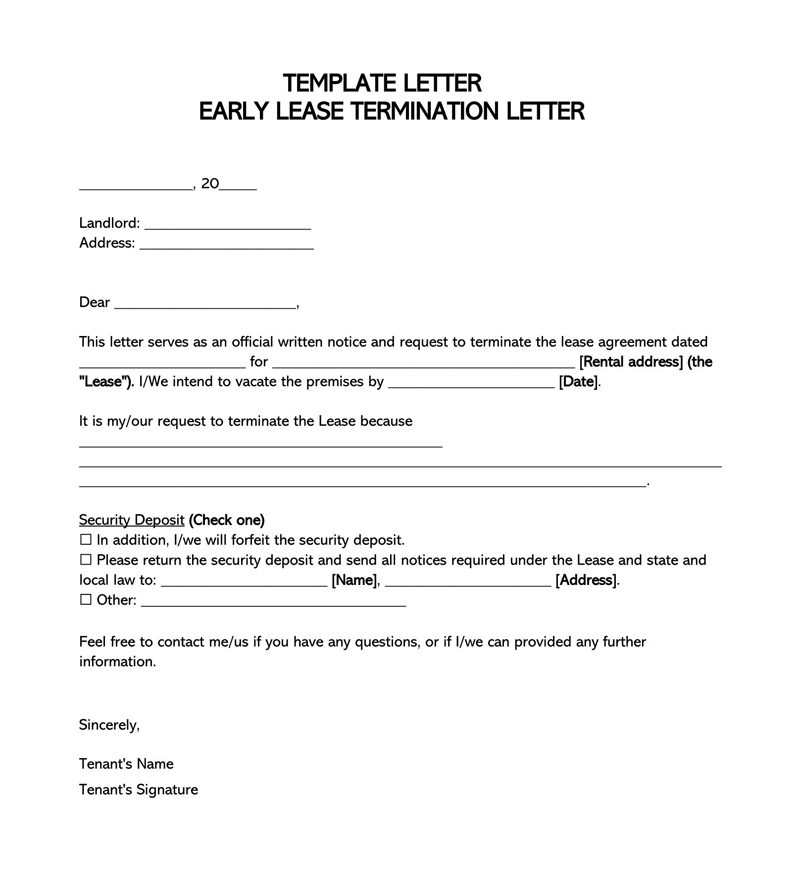
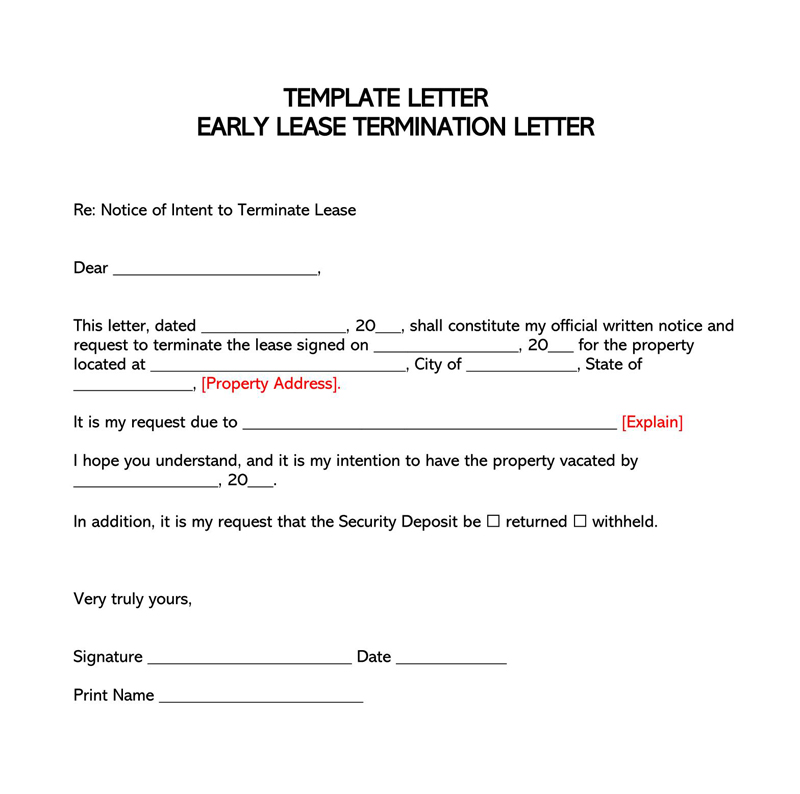
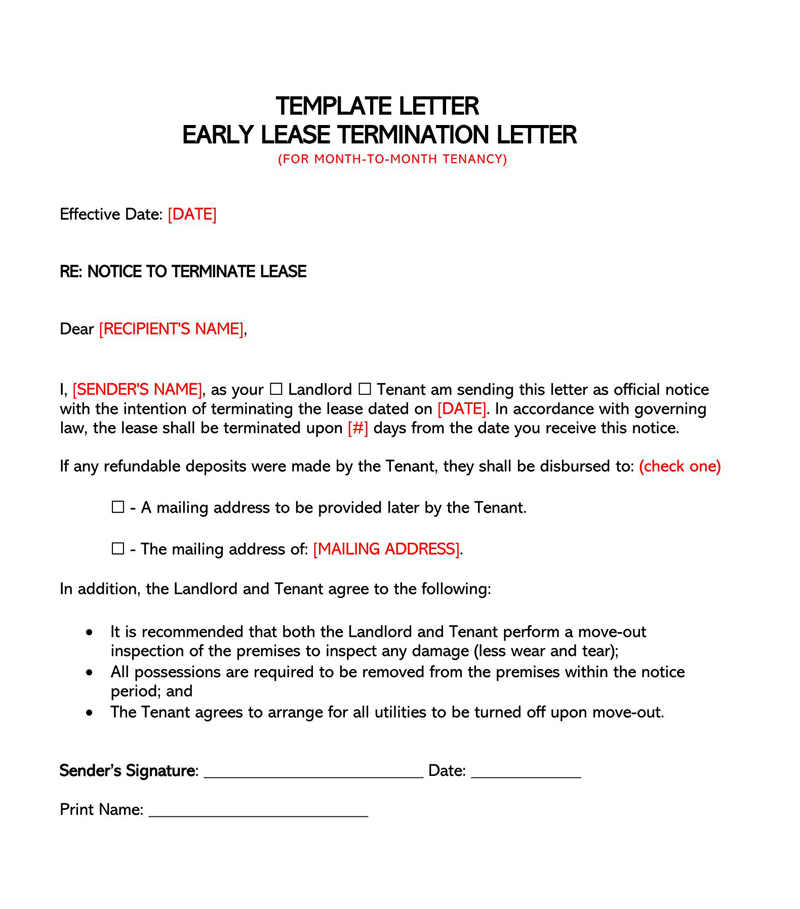
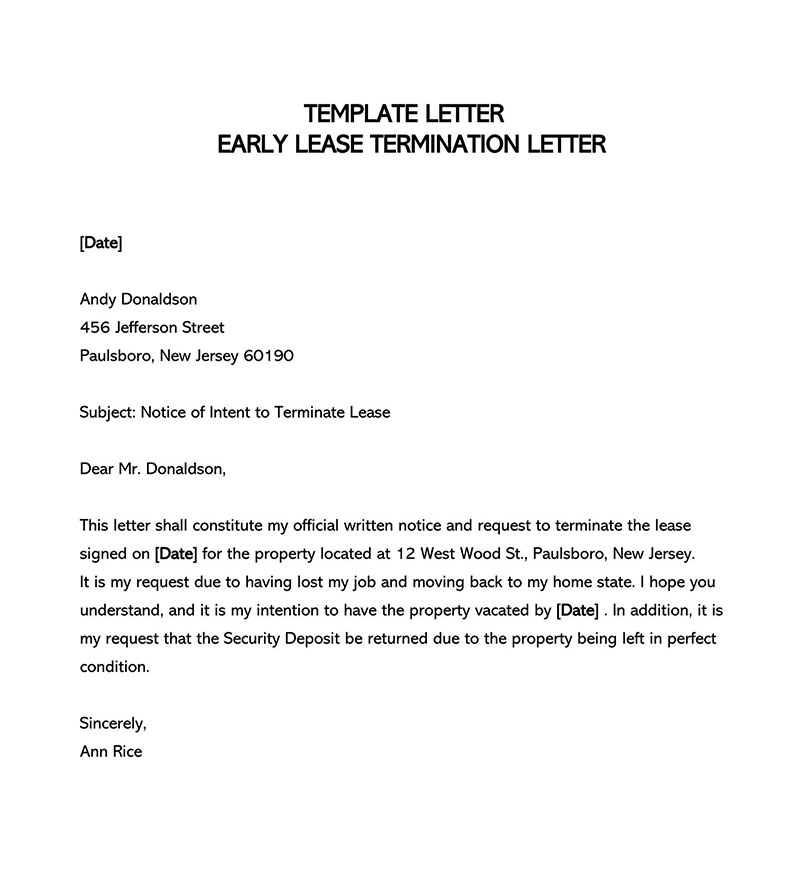
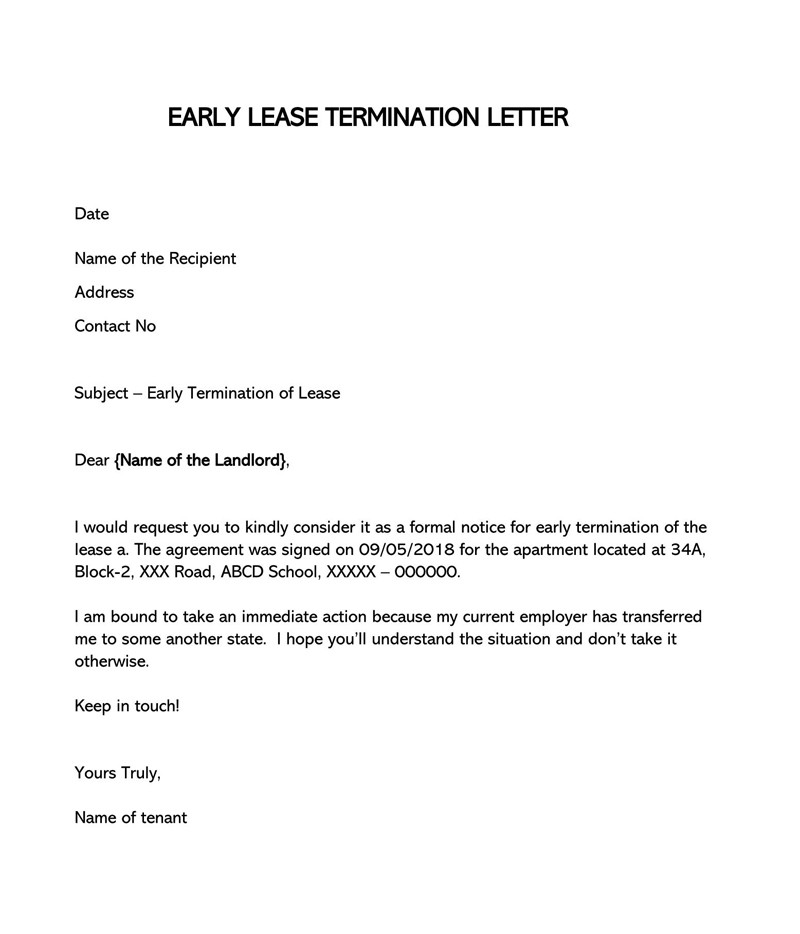
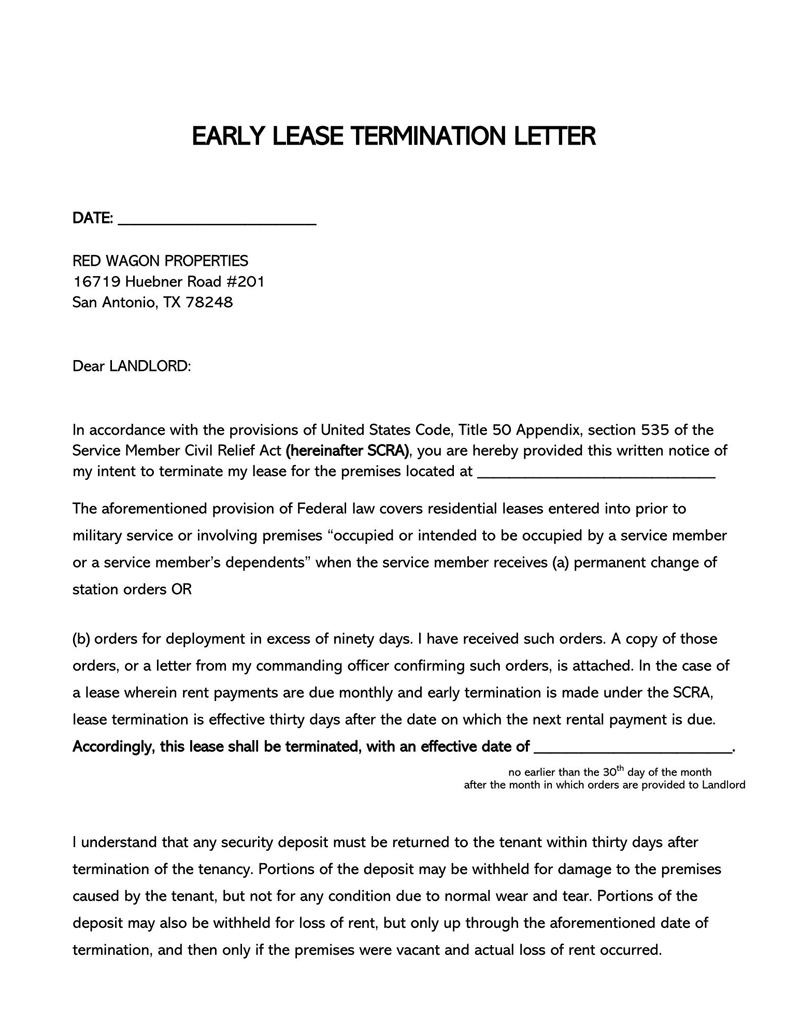
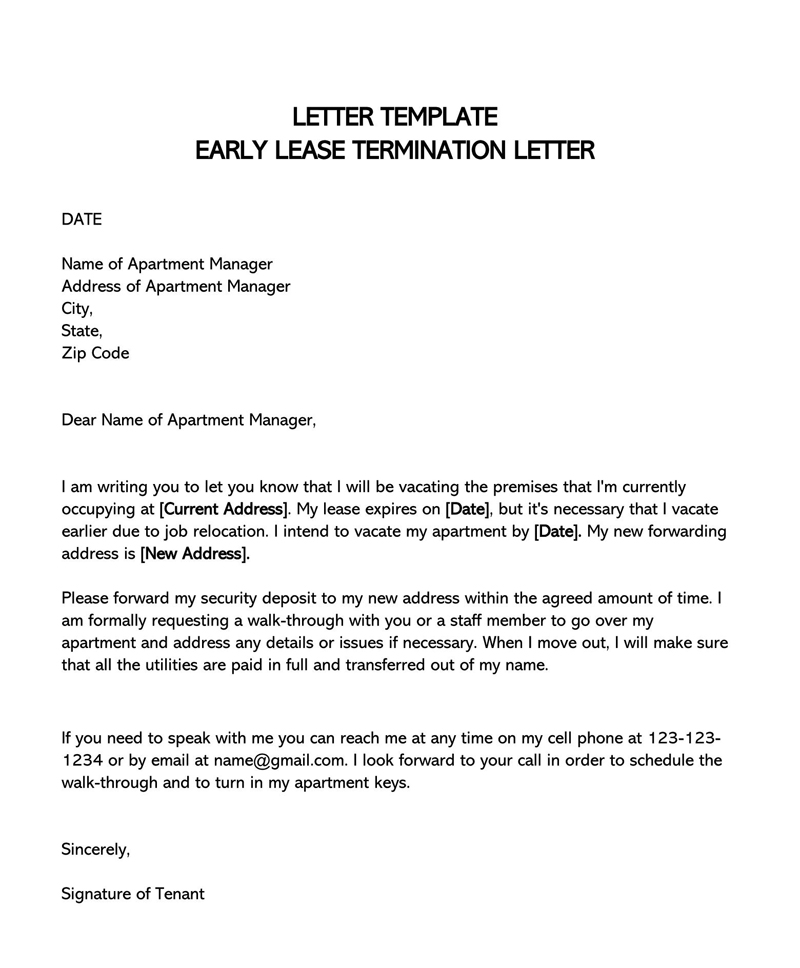
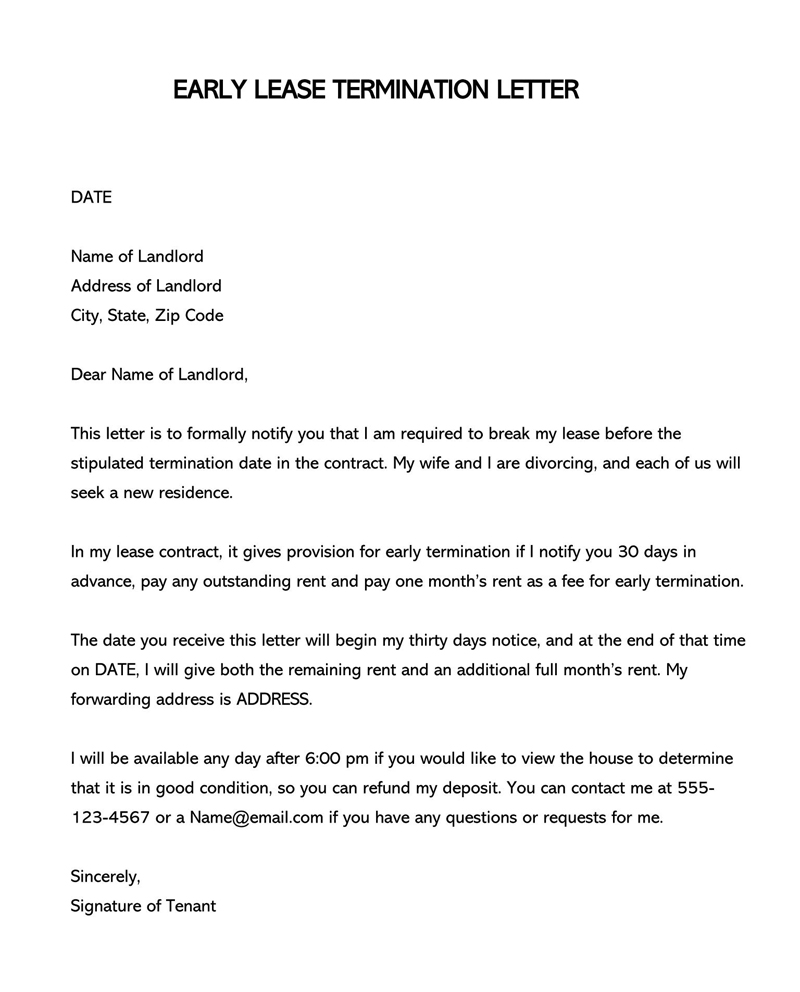
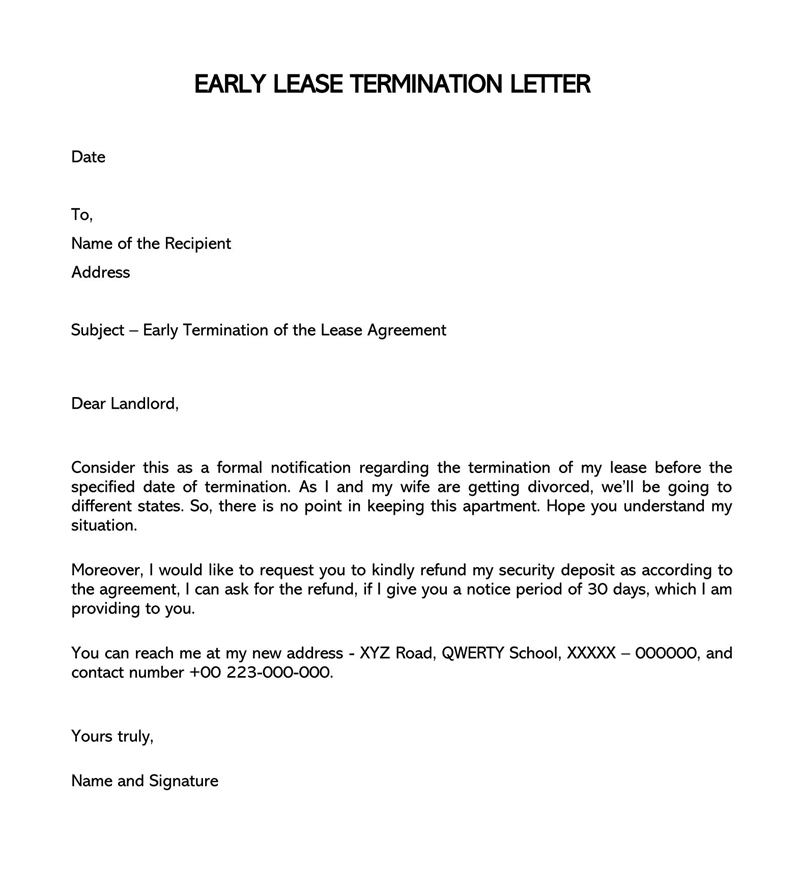
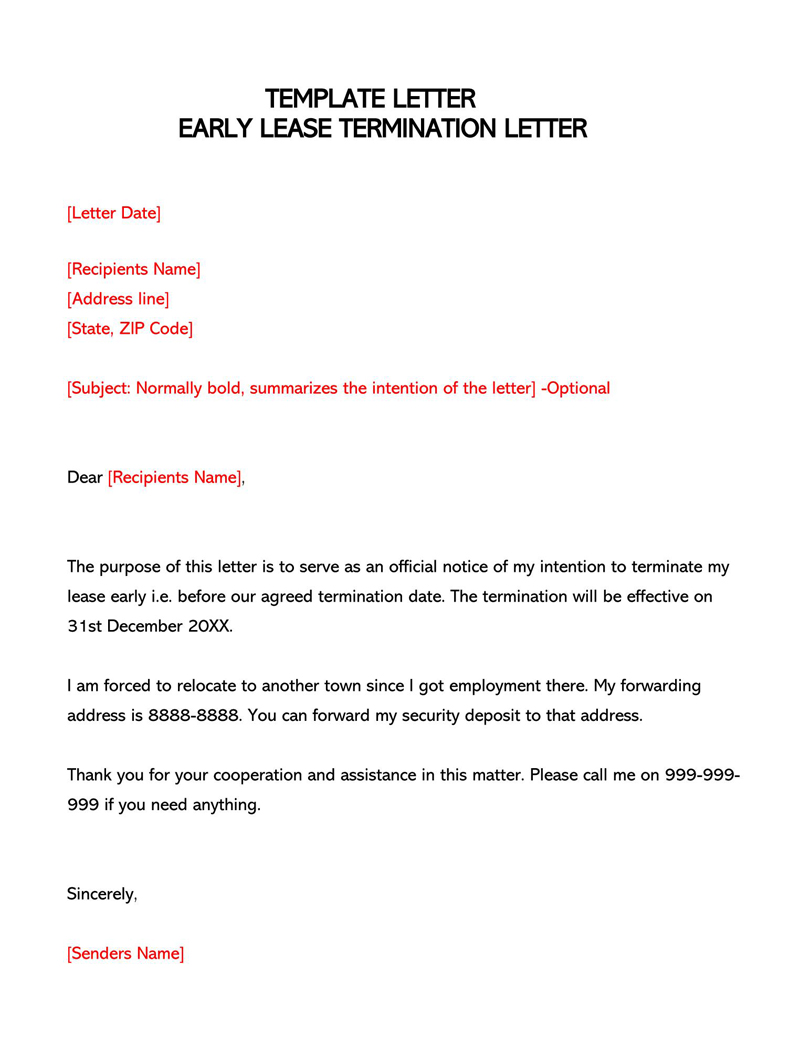
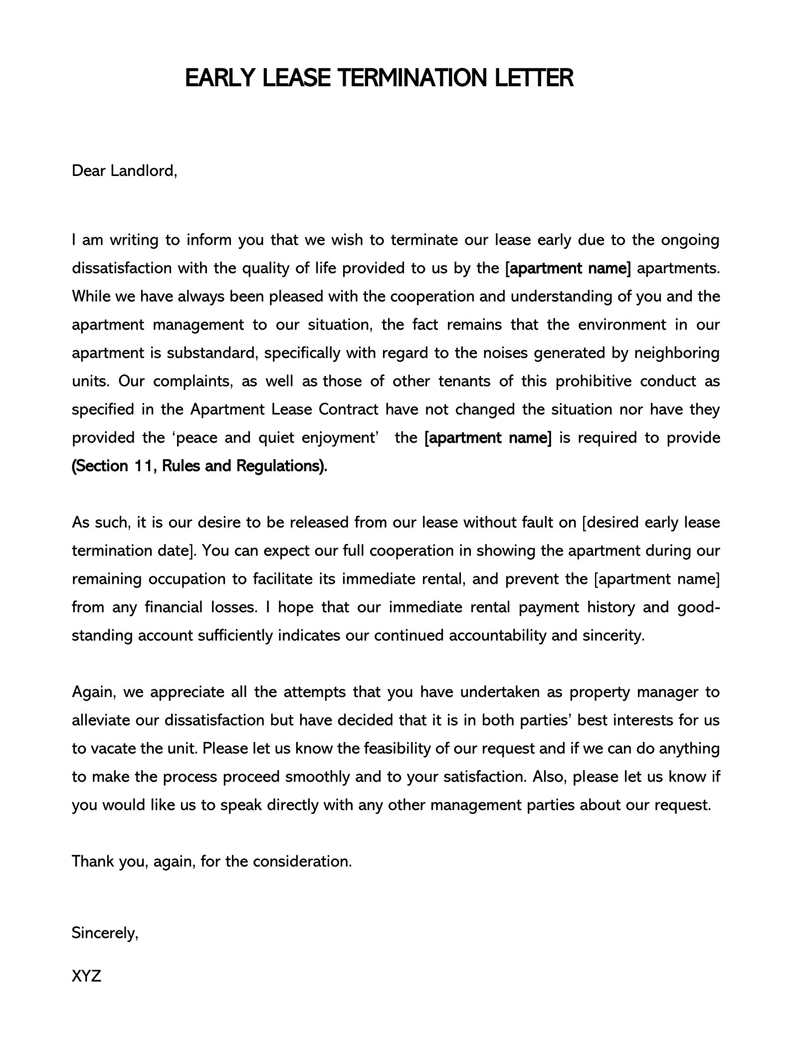
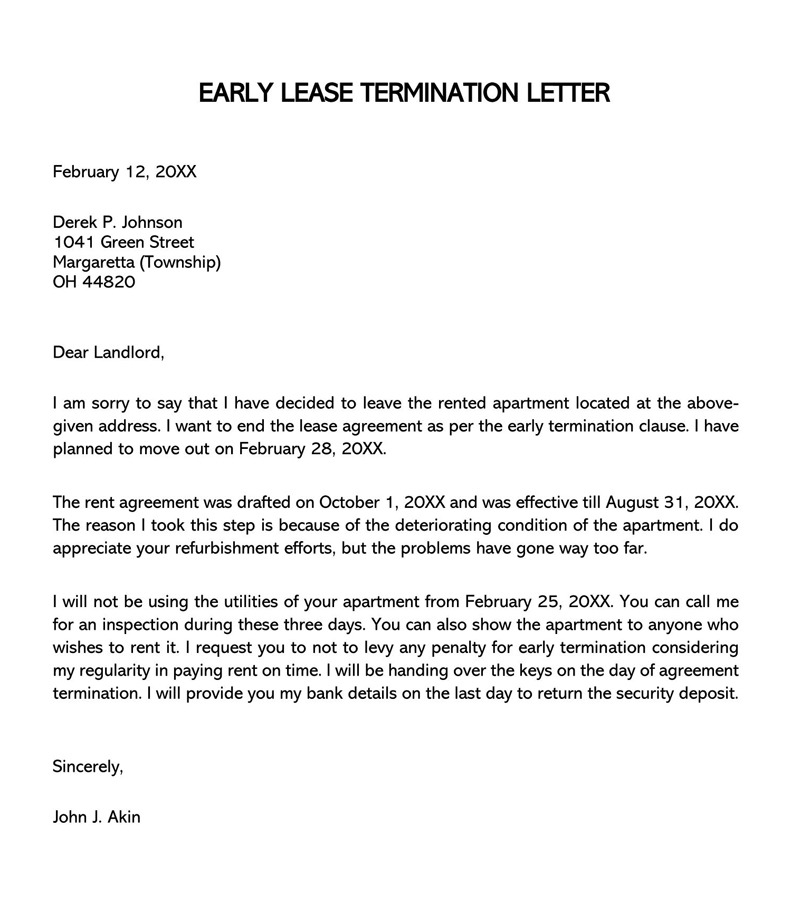
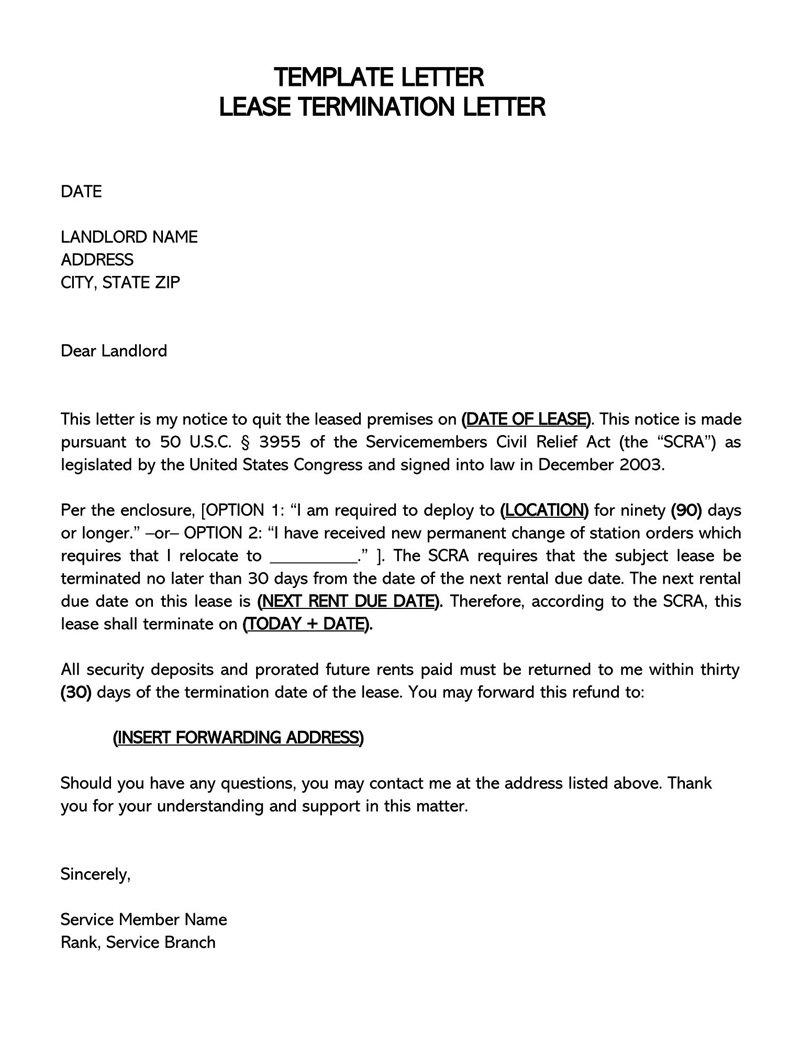
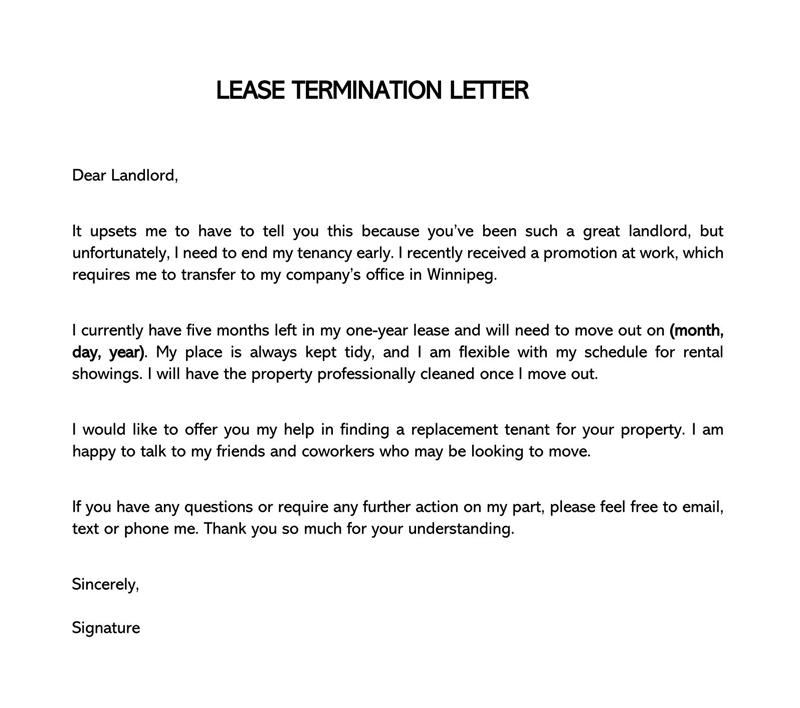
Why You May Want to Terminate the Lease Early
As mentioned earlier, diverse reasons can lead to the early termination of a lease agreement. It is a legal document that cannot simply be broken without legal and financial ramifications. However, several legal reasons for canceling a lease agreement can guarantee leniency to tenants.
Some of these reasons are discussed below:
Financial issues
One common, justifiable reason why tenants tend to terminate lease agreements early is financial constraints. Sometimes tenants can face financial problems, such as getting laid off from work in between tenancy periods, resulting in having to terminate the lease to cope with the situation (inability to raise rent). This reason is considered legally justifiable, and in such a situation, writing this letter would be necessary.
The military is deploying you
Entering active military service is another legally justified reason for terminating a lease agreement earlier than projected without penalty. This right is awarded to active military personnel through the Service Members Civil Relief Act, as long as the tenant signed the lease before being deployed. The tenant should present to the landlord a written letter of early lease termination, after which their tenancy is terminated 30 days after the next rent payment due date.
You’re leaving because of domestic violence
Domestic violence is another prioritized reason for tenants’ early termination of lease agreements. Therefore, if you’re a signatory to a lease agreement and happen to be a victim of domestic violence during the tenancy, most state laws permit you to cancel the lease before the expected expiration date. The early termination can be written as a notice to the landlord while giving the applicable reasons for this termination.
The rental unit is unsafe or violates health and safety codes
Rental properties are expected to comply with local and state housing codes. If a property fails to meet these standards, tenants can file for constructive eviction through a court exempting them from contractual obligations such as monthly rent payments. As a tenant, ensure to follow the right procedures for vacating an inhabitable piece of property, including providing written notice to the landlord and a termination letter.
The landlord violates your privacy rights
Tenants, by law, are entitled to privacy and the “quiet enjoyment” of the property they are renting. This prevents landlords from entering the rented premises without notice, typically 24 hours. Other than unexpected visits, breaches of peace include excessive phone calls from the landlord, loud neighbors, constant dog barking, etc. Under these circumstances, tenants can leave prematurely as long as they issue a notice through a termination letter of early lease.
The rental unit is illegal
If the house being rented has some irregularities, for example, lack of a rental license, no lead inspection, or has not been determined as suitable for occupancy by the state, a tenant can terminate the lease agreement earlier than the expiry date. The tenant will also be compensated by the landlord, which will eventually help them find a new rental. This is because the rental unit is deemed illegal, and it is the landlord’s obligation to ensure the property is compliant before tenants move in.
Other possible reasons
Other than the mentioned reasons, a lease can be prematurely terminated for other reasons, such as in habitability due to lack of maintenance and repairs, harassment or stalking within the premises, moving in with a spouse or moving into a retirement home, etc.
Template
Writing an early lease termination letter involves clearly stating your intentions, providing relevant details, and maintaining a professional tone.
Below is a template for an early lease termination letter. You should adjust the specifics to fit your situation:
template
[Your Name]
[Your Address]
[City, State, Zip Code]
[Email Address]
[Phone Number]
[Date]
[Landlord’s Name or Property Management Company]
[Landlord’s Address or Company’s Address]
[City, State, Zip Code]
Dear [Landlord’s Name/Property Manager’s Name],
Subject: Request for Early Termination of Lease Agreement
I am writing to formally request an early termination of my lease agreement for the property located at [Your Rental Property Address]. As per the terms of our agreement, the lease is scheduled to end on [Original Lease End Date]. However, due to [explain your reason – e.g., a job relocation, personal circumstances, health issues], I find myself in a position where I must vacate the property earlier than anticipated.
I understand that early termination of the lease is not standard practice and I am prepared to comply with the terms outlined in our agreement regarding early departure. To facilitate a smooth transition, I propose the following:
1. Vacating Date: I intend to vacate the property by [Proposed Vacating Date], ensuring that it is left in a clean and tidy condition.
2. Lease Termination Fee: I am aware that a lease termination fee may be applicable as per our contract, and I am prepared to fulfill this obligation.
3. Property Inspection: I would like to schedule a final walk-through inspection of the property on or before [Proposed Inspection Date] to ensure that any potential issues are addressed.
4. Security Deposit: I request that my security deposit be returned, minus any deductions for damages beyond normal wear and tear, within the time frame specified by state law.
I hope to resolve this matter with minimal inconvenience to both parties and am willing to assist in the transition process, including making the property available for viewing by potential new tenants.
Please let me know if there are any specific procedures you would like me to follow during this process. I can be reached at [Your Phone Number] or via email at [Your Email Address]. Your understanding and cooperation in this matter are greatly appreciated.
Thank you for your attention to this request. I look forward to hearing from you soon to confirm the details of my lease termination.
Sincerely,
[Your Signature (if sending a hard copy)]
[Your Printed Name]
Free Sample Letter
Within this section, a free sample early lease termination letter is provided, serving as a practical tool for individuals in need of a formal and respectful means to conclude their lease obligations prematurely.
sample
Alex Johnson
123 Maple Street
Springfield, IL 62704
alex.johnson@email.com
(555) 123-4567
December 15, 20XX
Jonathan Smith
Smith Property Management
456 Oak Avenue
Springfield, IL 62706
Dear Mr. Smith,
Subject: Request for Early Termination of Lease Agreement at 123 Maple Street
I am writing to request an early termination of my lease agreement for the property located at 123 Maple Street, Springfield, IL. As outlined in our contract, the lease is due to expire on June 30, 20XX. However, I have recently encountered significant financial difficulties due to unforeseen medical expenses and a subsequent reduction in my income. This situation has regrettably forced me to reconsider my current living arrangements.
I am aware that this request is not in line with our initial agreement, and I am fully prepared to adhere to the terms specified in the lease for such situations. In light of my circumstances, I propose the following:
1. Vacating Date: My intention is to vacate the property by February 28, 20XX, ensuring that it is in excellent condition for the next tenant.
2. Lease Termination Fee: I understand that a fee may be applicable for early lease termination, and I am willing to comply with this requirement.
3. Property Inspection: I would like to arrange a final inspection of the property on or before February 25, 20XX, to address any concerns.
4. Security Deposit: I kindly request the return of my security deposit, subject to deductions for any damages, as per state regulations.
I aim to make this process as smooth as possible and am ready to assist with the transition, including facilitating property viewings for prospective tenants.
Please advise me on any specific procedures you wish for me to follow. You can reach me at (555) 123-4567 or via email. I appreciate your understanding and cooperation in this matter.
Thank you for your prompt attention to this request. I look forward to your confirmation of the termination details.
Sincerely,
[Your Signature]
Alex Johnson
Analysis
The provided early lease termination letter serves as an effective guide for individuals seeking to navigate the delicate process of ending a lease agreement prematurely, particularly under challenging circumstances such as financial hardship. Key elements contributing to its professional quality include a clear structure, respectful tone, and attention to detail, which are essential in maintaining a positive relationship with the landlord and ensuring legal compliance.
Firstly, the letter begins with a standard formal letter format, including the sender’s and recipient’s addresses and the date, which establishes a professional tone. The subject line succinctly states the purpose of the letter, enabling the landlord to immediately understand its intent. This clarity is crucial in professional communication.
Secondly, the body of the letter is well-organized and articulate. It opens with a direct yet courteous request for lease termination, followed by a brief explanation of the circumstances necessitating this action. The inclusion of a personal reason, such as financial hardship, adds a level of transparency, fostering understanding and potentially empathy from the landlord.
Furthermore, the letter demonstrates a proactive approach by the tenant. It outlines specific proposals for vacating the property, addressing the lease termination fee, conducting a final inspection, and handling the security deposit. This not only shows respect for the lease agreement but also exhibits the tenant’s responsibility and willingness to cooperate, which are key to maintaining a professional relationship.
Additionally, the tone throughout the letter is respectful and formal, which is essential in any business correspondence. It acknowledges the potential inconvenience to the landlord and expresses appreciation for their understanding, which can be crucial in negotiations.
Finally, the closing of the letter reiterates the tenant’s contact information, invites further communication, and ends with a formal sign-off. This ensures that the lines of communication remain open, facilitating a smoother resolution to the situation.
In summary, this letter serves as a comprehensive guide due to its clear structure, respectful and formal tone, transparency regarding the tenant’s circumstances, demonstration of responsibility, and open communication. These elements collectively contribute to making it an excellent template for individuals who find themselves in a similar situation and need to draft a professional early lease termination letter.
How to Terminate Your Lease Early
The process of terminating a lease prematurely needs to be carried out according to the stipulations of the lease agreement and applicable state rental laws. Due to your contractual rights as a tenant, the property owner is always at risk of being taken to court, forwarded to debt collectors, losing the security deposit, and damaging his or her reputation if he or she does not act appropriately.
This article will look into the straightforward steps of ending your lease agreement before the expiration date.
Step 1 – Send the early lease termination letter to your landlord
The process of terminating a lease prematurely is initiated with a termination letter. However, before writing it, it is recommended that you review the lease agreement to identify any stipulations regarding early terminations. Look out for terms associated with the notice period, termination fees, the termination clause, and other associated rules. If an early termination clause was included in the lease, follow the outlined procedure. If there aren’t any, follow the legal procedure applicable in the respective state.
Clear communication is fundamental during the entire process, and an early lease termination will typically be standard. Once you have familiarized yourself with the applicable provisions of the lease agreement, craft the letter and send it to the landlord. Try to send it as early as possible to give the landlord sufficient time to seek a replacement. Early notices ensure the process is completed smoothly.
Step 2 – Mutual lease termination agreement
Once this letter has been forwarded to the landlord, talk about how to complete the process. Firstly, specific terms should be written in a mutual lease agreement—a contract stipulating the date and the conditions under which the tenant will move out. Negotiations often occur when the original lease does not have an early termination clause and the tenant does not have special circumstances purporting the termination.
Some of the key areas that are negotiated include:
Forfeit security deposit
Losing your security deposit is one of the financial repercussions tenants should anticipate when terminating a lease prematurely.
note
Landlords can decide to keep the security deposit; therefore, you may need to channel your best negotiating skills to salvage all or part of the amount.
Ask for a buyout
Tenants can also ask for a buyout, a lump sum fee paid by a tenant as compensation to the landlord in exchange for absolving the tenant of all contractual obligations. In some cases, the security can be used as the buyout fee, whereas in other cases, landlords may ask for an additional fee above the security deposit.
Sublet the property
Subletting is another approach tenants can adopt to get landlords on board when moving out without necessarily terminating the lease. Proposing to sublet will occasionally be a better alternative for landlords as it eliminates the hassle of looking for a replacement tenant, which is normally a lot of work. A subletting clause could be added to the original lease agreement if it was not initially included.
Under a sublease agreement, the sub-tenant assumes the financial responsibility to cover monthly rent payments, but the tenant remains obligated to the original lease with the landlord. Therefore, the subtenant pays the tenant monthly rent, which the tenant forwards to the landlord. Subletting can be an incentive for landlords during negotiations since it eliminates the workload of searching for and screening new tenants for the landlord while guaranteeing that monthly rent payments will still be made as agreed upon in the original lease.
Other conditions
Other negotiation tactics suggest finding a replacement and paying a few months’ rent to give the landlord enough time to find a new tenant. However, note that the landlord must mitigate damages in most States and can therefore not sit back waiting for the lease term to end and then sue the tenant for rent accrued during that period, even if the lease was terminated prematurely. As a tenant, you should consult state laws or real estate attorneys in such a situation.
note
If you believe you have justified reasons to terminate a lease prematurely yet the landlord seems strictly resistant to the idea, it is recommended that state renting laws or legal counsel be consulted to ascertain the next course of action. There will typically be provisions protecting tenants and allowing them to cancel a lease prematurely without repercussions.
Step 3 – Keep all documentation
Always keep copies of any documentation used in the process of terminating a lease, for example, a copy of this letter, mutual termination agreement, original lease, etc. These documents may be presented as evidence of due diligence in court should you find yourself on the defensive side of contractual breach claims.
Step 4 – Move-Out
The last step on how to terminate a lease agreement early is moving out on the day agreed on. Honor the new agreement and do not stay past the move-out date as this would be considered a violation of the agreed terms. Also, collect the security deposit if applicable. Each State will have a State-specific security deposit return period, and as a result, the security does not have to be collected on the move-out date. However, it should be collected within the associated period.
What to Include
This letter should have certain key components to communicate a tenant’s intention formally and effectively.
Below are the basic components tenants should incorporate in their termination letter for an early lease:
Your personal information
Personal information, such as name and contact information, must be included in it. Also, add your address. This information is used to identify yourself to the landlord.
The landlord’s personal information
The landlord’s identification should also be presented in the letter. Write down their name, contact details, and address. This is a formal letter and, therefore, identifies the sender as well as the recipient.
Date of writing the letter
This is the date when the letter was written. Ensure to use the appropriate format, for example, dd/mm/yyyy.
Building and apartment details
A brief and precise description of the property in question should be given. Try to be as descriptive as possible by including location, type of rental (duplex, penthouse, etc.), house number, plot number, number of bedrooms, etc. The description in the letter should match the description in the original lease agreement.
Reason for termination
Tenants are required to give reasons for the sudden termination of the lease. Be diplomatic and give a comprehensive reason that doesn’t make the landlord question its legitimacy.
Requested termination date
It also includes a proposed termination date (also the date of moving out). This date can be negotiated once the landlord decides to accept your request for early lease termination.
Penalties and fees for early lease termination
The letter should declare any associated penalties the tenant is aware of. If an early termination clause exists in the original lease agreement, check the agreed-upon penalties and fees and list them in it. You can also include a payment plan to illustrate your commitment to ensuring the successful completion of the process.
Request an inspection before leaving
It is advisable to request an inspection before you vacate the premises. The inspection is meant to confirm if there are damages that need repairing so that you can attend to any repairs you’re liable to. The inspection date can be a few days or weeks before the move-out date.
Details of your forwarding address
Tenants should include their new address, where any correspondence can be forwarded later on, should the landlord have pending issues they want to discuss. Including a phone number in the termination letter is also recommended.
Reminder for the payment of the security deposit
The letter should be a reminder to the landlord that the tenant is entitled to a security deposit refund.
Keys and property
As part of moving out, tenants have to return keys to the property. Therefore, they should ask the landlord how they should return the keys to the house and other areas.
Dates and signatures
The tenant should then provide a signature followed by their name. The date of signing should also be declared.
Once the letter has been finalized, a copy should be made before sending it to the landlord. When sending it, a delivery method that verifies that the landlord receives the letter, such as certified mail with a return receipt or hand-delivery, should be used. Once received, this letter serves as formal notice to the landlord. A tenant shouldn’t move out before giving notice; otherwise, the landlord would be within legal limits to sue or charge the tenant rent for the months remaining on the lease term.
Final Thoughts
It is common to find yourself needing to move out in the middle of a lease term due to unavoidable circumstances such as financial constraints, deployment by the military, divorce, or domestic violence issues. In such a case, as a tenant, you are required to follow due diligence, which includes submitting a written notice to the landlord communicating your intention to terminate the lease prematurely.
This notice is referred to as a termination letter for an early lease. It must contain key components such as the tenant and landlord’s details, date, reason for termination, termination date, applicable penalties and fees, forwarding address, signature, and date of signing. Premature termination of a lease agreement is governed by the original lease agreement and applicable state renting laws, and it is advisable to review these stipulations before initiating the process.
Frequently Asked Questions
Since a lease is a binding agreement between a tenant and landlord, if you break the contract, you can expect any of the following repercussions: penalties, legal action due to breach of contract and damage, eviction on record, judgments and evictions affecting your credit score.
If you’re a victim of domestic violence,
If the landlord fails to meet their obligation
When you are a member of the military and you’ve received orders to change your station
If the landlord violates health codes
If the property is inhabitable.












